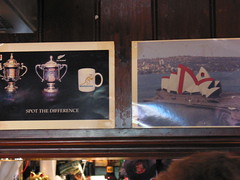The Null Device
2005/6/13
Goodle Good News, an all-good-news site, with headlines about politics ("World Peace sparks outpourings of joy", "Saddam patted on head and put back in his hole"), business ("Capitalists realise: "What's the point?"", "Daily Mail to shut: "Hate & fear not selling"", "arms industry to make vases, picnic tables"), technology ("Scientists pack up: "Everything explained""), the environment ("M25 turned into a garden", "Extinct species "coming back to life""), society ("Adults allowed to appreciate and play with children"), and the media ("George Lucas to re-film all three Star Wars prequels", "Radiohead to record "happy songs" (um, hang on, if they did that, how would they differ from Coldplay?)).
The blanding of St Kilda, once the sleazy, dangerous and vital epicentre of Melbourne underground culture and now safely homogeneous chrome-plated playground of the affluent, continues apace; now local independent record shop Raoul Records is closing down at the end of the month. Which means one fewer reason to venture south of the Yarra. I guess the Porsche-owners of the new St Kilda don't care much for weird little post-punk/garage-rock/psychobilly/country-and-Preston bands.
Your Humble Narrator recently travelled out of London and stayed briefly in the town of Brockenhurst, on the border of the somewhat misnamed New Forest.
Brockenhurst is a small country town in Hampshire (south-west of London); it either is or was cattle-farming country; at any time, there are cows and horses wandering about, and streets are fitted with strategically-placed cattle grids (as are many driveways). I was struck by how similar it looked to Australian country towns; of course, Australia got its agricultural and civic traditions mostly from Britain, but I didn't think there'd be so much similarity; the streets are slightly narrower, the houses older, and there are no eucalypts, but other than that, Brockenhurst could easily have been somewhere near Echuca or Dubbo. Except, possibly, for the pictures apparently mocking an Australian sports team above the bar at the pub:
During his stay there, Your Humble Narrator managed to bicycle through the New Forest proper. It's quite a picturesque place; contrary to the name, it's not new, but one of the largest stretches of original forest in Britain, having been preserved since the time of William the Conqueror (who used it as a hunting preserve). It's also inhabited by wild ponies, which roam pretty much at will (except for fenced areas where they are kept out, as not to eat newly-planted trees and such). Anyway, there are some photos here.
The next advance in Total Information Awareness (or whatever it's called) may be a technique, currently being developed in Canada, to detect suspicious activity by the absence of keywords in email; this is more sophisticated than looking for keywords in emails (as the NSA was believed to have been doing since the days of UUCP):
One difference might be the complete absence of words someone might possibly think would draw a law enforcement agencys attention to their e-mails, but that most people would occasionally use innocently (as in "my presentation yesterday really bombed".) Another, Skillicorn says, is that research shows people speak and write differently when they feel guilt about a subject, for instance using fewer first-person pronouns, like I and we. "If you're up to no good", he says, "it's very hard for you to write something that looks ordinary."
Skillicorn doesn't know all the ways suspicious e-mails might read differently from innocent ones. The beauty of his approach is that he doesn't need to know. His software is designed simply to look for messages that are different, based on word frequencies, from the mass of e-mails. It neednt understand the reasons for the differences.So, when this technology matures (assuming that the will is there, which if it isn't now, it will probably be in a few terrorist outrages' time), we can expect, at the heart of ECHELON or similar, supercomputers tracking the email traffic of individuals (by email address, IP number or possibly a cluster of identifiers) and monitoring them for variations; as soon as an individual's behaviour changes microscopically (regardless of what it changed from and to; this works much in the way that highly-skilled readers of body language such as TV mentalist Derren Brown can detect truthfulness or lies by familiarising themselves with natural patterns and watching for deviations), they can be flagged for review. This could detect conspirators, criminals or other deceivers (right down to people planning surprise parties for loved ones, or trying to conceal embarrassing secrets), or possibly other shifts in mental state (depression, anxiety and such). The possibilities of such a technology extend beyond merely catching potential terrorists (or paedophiles, or MP3 pirates, or tax avoiders, or pro-democracy activists, depending on jurisdiction); I imagine that, for one, intelligence agencies with access to it could use it for pinpointing the weakest links in organisations they are targetting for infiltration, or otherwise use it to flesh out psychological profiles.
Elsewhere in the article, it mentions the possibility of detecting telltale patterns of activity by traffic analysis alone, and mentions that the infamous Enron email collection is not particularly useful for such research because those sending the emails didn't actually try to pretend that they were doing anything other than screwing people over.